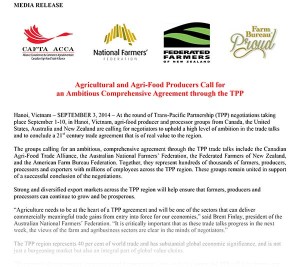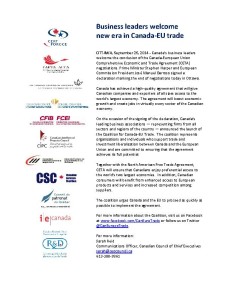Agricultural and Agri-Food Producers Call for an Ambitious Comprehensive Agreement through the TPP
 Hanoi, Vietnam – SEPTEMBER 3, 2014 – At the round of Trans-Pacific Partnership (TPP) negotiations taking place September 1-10, in Hanoi, Vietnam, agri-food producer and processor groups from Canada, the United States, Australia and New Zealand are calling for negotiators to uphold a high level of ambition in the trade talks and to conclude a 21st century trade agreement that is of real value to the region.
Hanoi, Vietnam – SEPTEMBER 3, 2014 – At the round of Trans-Pacific Partnership (TPP) negotiations taking place September 1-10, in Hanoi, Vietnam, agri-food producer and processor groups from Canada, the United States, Australia and New Zealand are calling for negotiators to uphold a high level of ambition in the trade talks and to conclude a 21st century trade agreement that is of real value to the region.
The groups calling for an ambitious, comprehensive agreement through the TPP trade talks include the Canadian Agri-Food Trade Alliance, the Australian National Farmers’ Federation, the Federated Farmers of New Zealand, and the American Farm Bureau Federation. Together, they represent hundreds of thousands of farmers, producers, processors and exporters with millions of employees across the TPP region. These groups remain united in support of a successful conclusion of the negotiations.
Strong and diversified export markets across the TPP region will help ensure that farmers, producers and processors can continue to grow and be prosperous.
“Agriculture needs to be at the heart of a TPP agreement and will be one of the sectors that can deliver commercially meaningful trade gains from entry into force for our economies,” said Brent Finlay, president of the Australian National Farmers’ Federation. “It is critically important that as these trade talks progress in the next week, the views of the farm and agribusiness sectors are clear in the minds of negotiators.”
The TPP region represents 40 per cent of world trade and has substantial global economic significance, and is not just a burgeoning market but also an integral part of global value chains.
“The growth of our countries’ economies and the support of jobs—which a successful TPP will help foster—are top priorities for the agriculture and agri-food sectors across the region,” said Lisa Skierka, president of the Canadian Agri-Food Trade Alliance. “The TPP has the potential to improve the competitiveness of our economies and enhance regional supply chains by permitting the production, processing and movement of products and ingredients among TPP countries where competitive advantages exist. Without a plurilateral agreement, the TPP could actually reduce the competitiveness of exporters if some TPP members provide greater market access to some countries than to others.”
Trade among TPP partners was more than $2 trillion in 2012. Eliminating tariff and non-tariff barriers among the member countries could help increase sales of agricultural products in the TPP market of 792 million consumers.
“New Zealand farmers have always strongly supported efforts to promote the benefits of free trade and particularly efforts to negotiate improved market access and reduce trade barriers for our exports. We strongly encourage efforts to reduce tariffs and non-tariff barriers and the elimination of agricultural subsidies and other policies that distort markets,” said said Dr William Rolleston, president of Federated Farmers of New Zealand. “Barriers to exports, such as subsidies or tariffs, reduce the ability of countries to trade.”
Agriculture and agri-food trade is critical to the economies of TPP countries. TPP offers the promise of important new opportunities to export and diversify for agriculture and agri-food businesses in the region.
“The TPP will only fulfill its promise of improved and increased trade in the Pacific region when it eliminates tariff and non-tariff trade barriers,” said Bob Stallman, president of the American Farm Bureau Federation. “U.S. agriculture has high expectations for the TPP. All countries involved must commit to a better agreement and freer trade worldwide.”
The Canadian Agri-Food Trade Alliance, the Australian National Farmers’ Federation, the Federated Farmers of New Zealand and the American Farm Bureau Federation remain committed to the need for meaningfull market access and elimination of tariffs and other barriers through TPP.
For further information, contact:
Claire Citeau
Executive Director
Canadian Agri-Food Trade Alliance (CAFTA)
cciteau@cafta.org
Tony Mahar
General Manager Policy and Trade and Economics
National Farmers’ Federation of Australia
tmahar@nff.org.au
Mark Ross
Genaral Manager Policy and Advocay
Federated Farmers of New Zealand
mross@fedfarm.org.nz
Will Rodger
Director Policy Communications
American Farm Bureau Federation
willr@fb.org
 OTTAWA, September 26, 2014 – Canada’s business leaders welcome the conclusion of the Canada-European Union Comprehensive Economic and Trade Agreement (CETA) negotiations. Prime Minister Stephen Harper and European Commission President José Manuel Barroso signed a declaration marking the end of negotiations today in Ottawa. Canada has achieved a high-quality agreement that will give Canadian companies and exporters of all sizes access to the world’s largest economy. The agreement will boost economic growth and create jobs in virtually every sector of the Canadian economy.
OTTAWA, September 26, 2014 – Canada’s business leaders welcome the conclusion of the Canada-European Union Comprehensive Economic and Trade Agreement (CETA) negotiations. Prime Minister Stephen Harper and European Commission President José Manuel Barroso signed a declaration marking the end of negotiations today in Ottawa. Canada has achieved a high-quality agreement that will give Canadian companies and exporters of all sizes access to the world’s largest economy. The agreement will boost economic growth and create jobs in virtually every sector of the Canadian economy.





